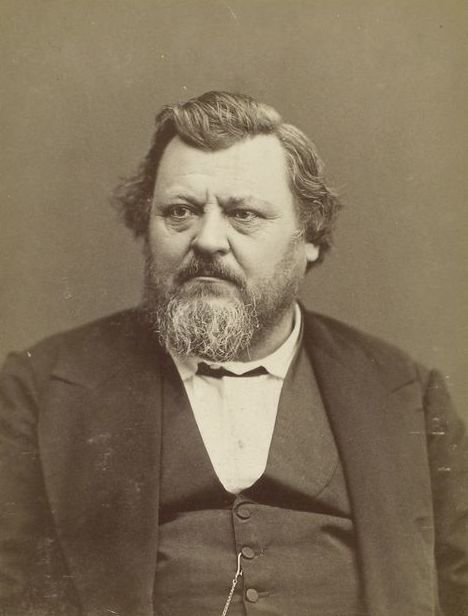
カール・フォークト
August Christoph Carl Vogt,
1817-1895

アウグスト・クリストフ・カール・フォークト(ド イツ語: [fo↪Lm_2D0] (listen); 1817年7月5日 - 1895年5月5日)は、ドイツの科学者、哲学者、科学普及者、政治家で、スイスに移住している。動物学、地質学、生理学に関する数多くの著名な著作を発 表した。1848年から49年にかけてドイツのフランクフルト議会で、その後はスイスで、生涯にわたって政治活動に従事した[5]。
| August Christoph Carl
Vogt (German: [foːkt] (listen); 5 July 1817 – 5 May 1895) was a
German scientist, philosopher, popularizer of science, and politician
who emigrated to Switzerland. Vogt published a number of notable works
on zoology, geology and physiology. All his life he was engaged in
politics, in the German Frankfurt Parliament of 1848–49 and later in
Switzerland.[5] |
アウグスト・クリストフ・カール・フォークト(1817年7月5日
-
1895年5月5日)は、ドイツの科学者、哲学者、科学普及者、政治家で、スイスに移住している。動物学、地質学、生理学に関する数多くの著名な著作を発
表した。1848年から49年にかけてドイツのフランクフルト議会で、その後はスイスで、生涯にわたって政治活動に従事した[5]。 |
| Vogt was born in Giessen, the
son of Philipp Friedrich Wilhelm Vogt [de], professor of clinics, and
Louise Follenius. His maternal uncle was Charles Follen.[6] From 1833
to 1836, he studied medicine at the University of Giessen, and
continued his training in Berne, Switzerland, earning his PhD. in 1839.
He then worked with Louis Agassiz in Neuchâtel.[7] |
ヴォーグは臨床教授であったフィリップ・フリードリヒ・ヴィルヘルム・
ヴォーグ[de]とルイーゼ・フォレニウスの息子としてギーセンに生まれた。1833年から1836年までギーセン大学で医学を学び、スイスのベルンでさ
らに修行を積み、1839年に博士号を取得した。その後、ヌーシャテルでルイ・アガシズのもとで働く[7]。 |
| In 1847 he became professor of
zoology at the University of Giessen, and in 1852 professor of geology
and afterwards also of zoology at the University of Geneva. His earlier
publications were on zoology. He dealt with the Amphibia (1839),
Reptiles (1840), with Mollusca and Crustacea (1845) and more generally
with the invertebrate fauna of the Mediterranean (1854).[8] In 1842,
during his time with Louis Agassiz, he discovered the mechanism of
apoptosis, the programmed cell death, while studying the development of
the tadpole of the midwife toad (Alytes obstetricans). Charles Darwin
mentions Vogt's support for the theory of evolution in the introduction
to his The Descent of Man, and Selection in Relation to Sex (1871). Vogt was a proponent of scientific materialism and atheism,[9] eager to engage in public debates with philosophical and scientific opponents, such as in his work Köhlerglaube und Wissenschaft of 1855, which was reprinted four times the same year.[10] Vogt defended the theory of polygenist evolution; he rejected the monogenist beliefs of most Darwinists and instead believed that each race had evolved from a different type of ape.[11] He wrote the White race was a separate species from Negroes. In Chapter VII of his Lectures on Man (1864), he compared the Negro to the White race and described them as “two extreme human types”. The differences between them, he claimed, are greater than those between two species of ape; and this proved that Negroes are a separate species from Whites.[12] He was elected as a member to the American Philosophical Society in 1869.[13] He died in Geneva at the age of 77. |
1847年にギーセン大学の動物学教授となり、1852年にはジュネー
ブ大学の地質学教授となり、その後動物学教授にもなった。彼の初期の出版物は動物学に関するものであった。両生類(1839年)、爬虫類(1840年)、
軟体動物・甲殻類(1845年)、さらに地中海の無脊椎動物(1854年)を扱った[8]。ルイ・アガシとの共同研究時代の1842年に、ミドワイガニ
(Alytes
obstetricans)のおたまじゃくし発生の研究中にアポトーシス(プログラム細胞死)の機構を発見した。ダーウィンは、『人間の進化と性による選
択』(1871年)の序文で、フォクトの進化論への支持に触れている。 フォークトは科学的唯物論と無神論の支持者で、1855年の著作『Köhlerglaube und Wissenschaft(炭焼きの信仰と科学)』(同年4回再版)など、哲学的・科学的反対者と公開討論をすることに熱心だった[10]。 フォクトは多系統進化論(多元論)を擁護し、ほとんどのダーウィン主義 者の単系統説を否定し、代わりにそれぞれの人種が異なるタイプの猿から進化したと信じていた[11]。『人間についての講義』(1864年)の第7章で、 彼は黒人と白人を比較し、「2つの極端な人間型」として記述している。1869年にアメリカ哲学協会の会員に選出された[12]。 ジュネーブで77歳で死去した[13]。 |
| Vogt was active in German
politics and was a left-wing representative in the Frankfurt
Parliament. Karl Marx scathingly replied to attacks by Carl Vogt in his
book Herr Vogt (Mister Vogt) in 1860.[14] Marx's defenders pointed to
the fact that, years later (1871), records published after the fall of
the Second Empire proved that Vogt had been indeed secretly in the pay
of the French Emperor.[15] |
フォークトはドイツの政治に積極的で、フランクフルト議会の左派代表を
することができた。カール・マルクスは1860年に著書『フォークト殿』でカール・フォークトの攻撃に痛烈に反論した[14]。マルクスの擁護者は、数年
後(1871年)、第二帝政崩壊後に発表された記録から、フォークトが確かにフランス皇帝に密かに仕えていたことが証明された事実を指摘する[15]。 |
| The city of Geneva, Switzerland
named a boulevard (Boulevard Carl-Vogt) after Vogt and erected a
memorial bust in front of a building of the University of Geneva.[16]
In September 2022, the university board of the University of Geneva
decided to change the name of a university building named after Carl
Vogt due to his racist and sexist theories.[17] |
スイスのジュネーブ市は、大通り(Boulevard
Carl-Vogt)をフォークトにちなんで命名し、ジュネーブ大学の建物の前に記念胸像を建てた[16]。
2022年9月に、ジュネーブ大学の大学理事会は、カール・フォークトの人種差別・性差別理論を理由に彼の名前をつけた大学の建物の名前を変更する決定を
した[17]。 |
+++
Links
リンク
文献
その他の情報



++
Copyleft,
CC, Mitzub'ixi Quq Chi'j, 1996-2099